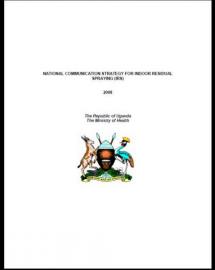National Communication Strategy for Indoor Residual Spraying [Uganda]
This Indoor Residual Spraying (IRS) Communication Strategy is a complement to the Communication Strategy for Malaria Control in Uganda 2005-2010. The strategy prioritizes the following communication problems and challenges for IRS communication, which are:
- Few people know about IRS generally: how it is applied, its effectiveness and safety in controlling malaria;
- Most people do not know who will be targeted for IRS or the rationale for targeted spraying;
- Leaders and household members in targeted areas do not know what is required of them during the spray exercise; and
- There is widespread misinformation about DDT, particularly its safety and effectiveness.
In order to achieve this goal, the strategy prioritizes three primary audiences: national and local leaders in areas targeted for IRS; heads of household and institutions targeted for spraying; and media representatives.
The strategy aims to increase the uptake and acceptance of IRS and the insecticides used by addressing critical information gaps regarding the effectiveness of IRS and the various insecticides used.
The communication approaches described comprise a multi-channel approach that includes mass media using print and radio, and community mobilization approaches including community meetings and a documentary style video on IRS.
Source: Uganda Ministry of Health, Johns Hopkins University Center for Communication Programs, Roll Back Malaria
Date of Publication: March 25, 2019
SIMILIAR RESOURCES
Tools
Examples
- SBCC for Malaria in Pregnancy: Strategy Development Guidance
- Generic Algorithm to Aid Action Planning at District and Regional Levels
- Promoting Quality Malaria Medicines Through SBCC: An Implementation Kit
- Plan Stratégique National de Plaidoyer en matière de lutte contre le Paludisme (PSNPP) en Côte d'Ivoire 2018-2023
- Integrated Management Strategy for Dengue Prevention and Control
- ITN Access and Use Report 2018
- Social and Behavior Change Considerations for Areas Transitioning from High and Moderate to Low, Very Low and Zero Malaria Transmission
- CDC’s Guiding Principles for Public-Private Partnerships: A Tool to Support Engagement to Achieve Public Health Goals
- Evidence to Inform Social and Behavior Change for Family Planning in Francophone West Africa
- Writing a Communication Strategy for Development Programmes: A Guideline for Programme Managers and Communication Officers

